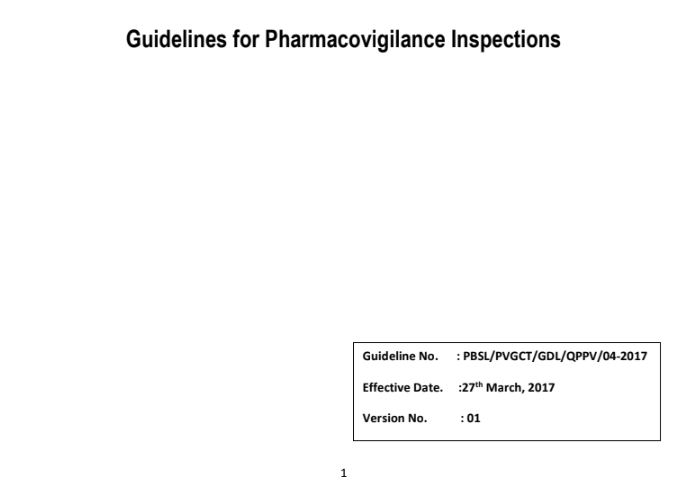Fill out the form below to receive the complete PDF guide directly in your inbox. This resource provides clear, step-by-step guidance to help you make the most of the information we’ve prepared for you.
Sierra Leone
Guidelines for Pharmacovigilance Inspections
These guidelines establish the framework for the Pharmacy Board of Sierra Leone (PBSL) to conduct Pharmacovigilance (PV) inspections to verify compliance by Marketing Authorization Holders (MAHs). They define the various objectives and types of inspections, including routine, ‘for cause,’ announced, unannounced, and re-inspections. The document mandates that inspections will cover all aspects of the MAH’s PV system, including documentation, personnel, and the quality system. Non-compliance can lead to a range of sanctions, from additional monitoring and fines to the suspension or revocation of the Marketing Authorization.

Use Cases
- Pharmacy Board of Sierra Leone (PBSL) – Ensure Compliance: The PBSL shall conduct PV inspections to assure that manufacturers’ representatives and MAHs comply with pharmacovigilance obligations within Sierra Leone.
- MAHs – Prepare for Inspection: MAHs and their representatives must ensure the PV system master file (PSMF), records, and personnel are ready for scrutiny during both announced and unannounced inspections.
- Inspectors – Conduct Different Types of Audits: Inspectors mandated by the PBSL will carry out various audits, including system-related, product-related, routine, and ‘for cause’ inspections.
- MAHs – Correct Deficiencies: Following an inspection, the MAH must immediately implement Corrective and Preventive Actions (CAPAs) to address any non-compliance findings identified by the inspectors.
- PBSL – Impose Sanctions for Non-Compliance: The Board may impose sanctions, such as placing a non-compliant MAH on high risk (leading to additional monitoring) or deferring an application for product registration.
- PBSL – Publicly List Non-Compliant Entities: The Board may consider making public a list of Manufacturer Representatives or MAHs found to be seriously or persistently non-compliant with the guidelines.
Key takeaways you'll learn
The resource’s purpose is to establish a rigorous, risk-based inspection program that ensures Marketing Authorisation Holders operating in Sierra Leone maintain a pharmacovigilance system that consistently adheres to regulatory requirements.
- Risk-Based Approach: The guidelines describe a risk-based PV inspection program, which includes ‘for cause’ inspections triggered by safety issues or non-compliance.
- Varied Inspection Types: The PBSL utilizes a range of inspection mechanisms, including pre-authorisation, post-authorisation, and unannounced inspections, to verify compliance at different stages of a product’s lifecycle.
- Focus on System Documentation: The inspection process emphasizes the verification of the Pharmacovigilance System Master File (PSMF), personnel qualifications, records, and the quality management system.
- Severe Sanction Ladder: The guidelines lay out a clear hierarchy of sanctions for non-compliance, ranging from corrective action plans and administrative fines to suspension or revocation of the Marketing Authorization.
- Transparency and Public Interest: The PBSL reserves the right to make public a list of MAHs found to be seriously or persistently non-compliant, promoting transparency and incentivizing adherence.


